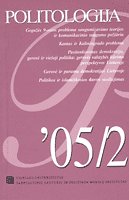Piliečiu Dalyvavimas Leidžiant Ástatymus
The Role Of Citizens In The Legislative Process
Author(s): Petras RagauskasSubject(s): Law, Constitution, Jurisprudence
Published by: Vilniaus universiteto leidykla & VU Tarptautinių santykių ir politikos mokslų institutas
Summary/Abstract: Different shortcomings have been attributed to both legislators (the people and the parliament) in all countries and at all times. The key shortcoming of the people as a legislator is its unability to duly solve state-level issues: the totality of citizens can easily be misled, they lack knowledge or competence on specific issues, their decisions are based on stereotypes etc. Another limitation of people is related to the possibility that anonymity of its decisions can provoke cruelty and intolerance. Despite logical validity of the above-mentioned shortcomings their practical correctness is not proven. Falseness is also not proven as the only existing example of a frequent people’s participation in legislation (Switzerland) among other things proving the falseness of the above-mentioned reproaches could hardly serve as a basis for generalisation. To the disadvantage of people as a legislator, a procedural argument is presented: during a referendum it is not possible to adopt a maximum best and balanced law as in every case there is a choice “either ... or”. There is a vote en bloc and no editorial (even most rational) amendments are possible. Besides, the legislation that involves a referendum is related to huge costs. The people’s participation in legislation is beneficial because it ensures a higher legitimacy of the decisions and brings people closer to the ruling elite (thus the gap between what citizens expect from the administration and what they receive from the administration is minimised), moreover, this guarantees every citizen’s right to participate in tackling his/her affairs. There is one case where the laws adopted by the people have all the strengths of the laws adopted by the parliament and the people, and avoid almost all the failings. These are ratification referenda where the parliament-approved draft laws are adopted (or rejected). The people is only a nominal legislator in Lithuania. The recent practice proves that currently the requirements for holding a referendum make it impossible to pass laws in referenda. This conclusion is confirmed by the fact that the requirements for initiating a referendum are practically impossible to meet: so far nobody has managed to collect 300.000 signatures required to initiate a referendum, i.e. 12 percent of the citizens of the Republic of Lithuania who have the right to vote.
Journal: Politologija
- Issue Year: 2005
- Issue No: 1 (37)
- Page Range: 055-091
- Page Count: 27
- Language: Lithuanian

